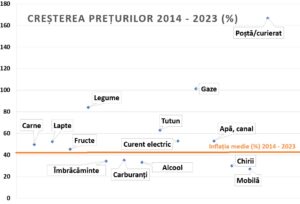 The discussion on transferring wage contributions, which under the current system are partly paid by the employee and partly by the employer, fully to the employee’s responsibility has much wider connotations and little publicly discussed.
The discussion on transferring wage contributions, which under the current system are partly paid by the employee and partly by the employer, fully to the employee’s responsibility has much wider connotations and little publicly discussed.
Let’s just give two examples, the first of which secretly affects the employee’s income, and the second one, for symmetry and compliance, the employer’s costs. Both being in the position of taxpayers to the budget of the law-making and law-changing state in search of more money for the budget. In fact, the purpose of the entire change in the tax payment.
1.The personal deduction of 300 lei for a gross income below 1,500 lei would be reduced by raising the gross amount to the level of 1,750 lei announced by the Labour Minister, to the former amount of 250 lei, which would negatively affect the net income. Apparently only a beneficiary of the income tax rate decrease from 16% to 10%. Obviously, the higher the wages, the larger the lessening effect on the personal deduction and the more affected the net income.
But the limits in the application of personal deductions (regressive and by the way why regressive and not fixed?), will they be maintained between 1,500 lei and 3,000 lei, despite the increase in salaries over the last ten years (the limit of 3,000 lei was fixed then)?
2. What about the 0.85% of the gross wage applied for medical leave and social security benefits (abbreviated FNUASS), the 0.4% for the risk and accidents fund and the wage claims fund (0.25% of the gross salary)? In total, 22 lei (12 lei + 6 lei + 4 lei) now paid by the employer, besides the much-known pension contribution (15.8% for normal conditions), health contribution (5.2%) and unemployment (0.5%). What will be the quotas “forgotten” in the public debate and will they apply to the new increased gross wage, with the consequent effects regarding the increase of the wage costs?
To those who do not want to be taken for a fool by this tv presentation approach, by one side or the other, depending on the political position and trade union fears, let’s put some order in a few statements and then we shall leave you the pleasure of deciding by yourself what will happen.
So, the decrease from 39.25% to 35% of total contributions paid to the budget from the work done is a joke, more or less good. That is because 35% of the potential new reference gross wage of RON 1,750 means 612 lei representing the tax compared to 39.25% of the current reference minimum gross wage of 1.450 lei, which means only 569 lei representing the tax. Or 43 lei less per employee calculated for the minimum national wage.
But how does the employee’s net wage remain untouched? By lowering the tax rate from 16% to 10%, the state will take less from the income tax by about the amount it will collect additionally from the contributions (for the non-payment of which it will put the private employers under the criminal law). Therefore, it is perfectly possible for the employee not to lose anything from the net wage (some lei above or below will not make a real difference).
However, the thing with the increase of future pensions due to the increase of contributions does NOT work. Although the amounts collected by the state will be higher, they will be equally „higher” for all employees, which means they will not change the ratio between them, namely the score considered when establishing the pension. Which is based on the score and not the contribution but this is a separate topic, which deserves a special separate space.
In fact, all this move is aimed at increasing the amounts collected to the budget for the recently, hazardously increased pensions, unsustainable on mid and long-term anyway. At the same time, the subsidies from the state budget would be reduced and the budget will anyway lose on the income tax side, which will not improve the public deficit that is steadily heading above the allowed level of 3% of GDP.
But the nicest thing, which almost nobody seemed to notice, is the GENERALIZED decrease of the income tax from 16% to 10%. That will massively favour those with the highest incomes and deepen the record gap within the EU between the richest and the poorest at the national level. Where we register a record ratio of 8.2, about double the European average.
Perhaps, instead of measures to „optimize” the budget by a curious left-right wing mix, aimed at attracting the crowd’s votes for the benefit of a small group (sounds like South America, right?), it would be more useful to increase, to the benefit of the middle class (if you still remember what the phrase means) and following the European model, the standard tax rates and SIMULTANEOUSLY introduce more consistent and justified tax deductions.
It seems counterintuitive and may sound like hell from the political perspective to raise taxes (if you are to take social commitments without having the money you need) but leaving some significant GENERALIZED deductions would benefit those who earn small and medium incomes and the ability of the state to implement social policies through appropriate tax policies. Based on which to reach EFFICIENT TAX RATES such as 10% only for those who need them or help the economic growth.









